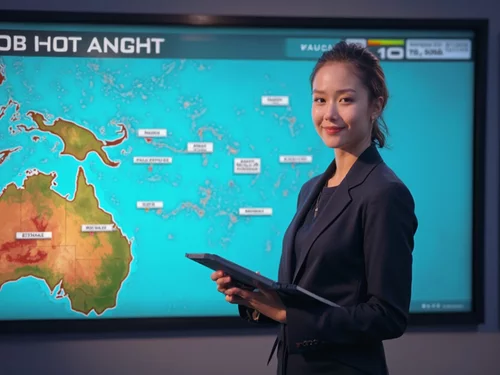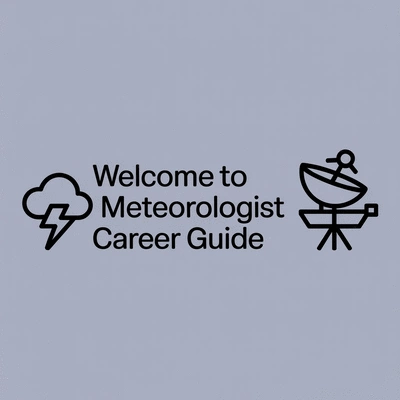Have you ever looked up at the sky and wondered what those swirling clouds mean for the day ahead? Understanding weather patterns can seem daunting, but with the right insights, anyone can decode the skies. This article unveils the essential roles and opportunities in meteorology, guiding aspiring meteorologists on their journey.
What You Will Learn
- Meteorologists analyze data from various sources, including satellites and radar systems, to create accurate weather forecasts.
- Career paths in meteorology include roles such as Broadcast Meteorologist, Research Scientist, and Climate Analyst, each offering unique challenges and rewards.
- Specializations within meteorology, like Severe Weather Specialist and Climatology, allow professionals to focus on specific aspects of atmospheric science.
- Key steps to a successful career in meteorology involve selecting the right educational pathways, gaining practical experience, and pursuing ongoing professional development.
Path to a Meteorology Career in Australia
The journey involves key steps and opportunities, from education to practical experience and professional networking.
Key Steps for Aspiring Meteorologists
- ✓ Choose the Right Degree
- ✓ Gain Practical Experience
- ✓ Develop Essential Skills
- ✓ Network with Professionals
- ✓ Consider Advanced Training
Opportunities & Connections
- ► Informational Interviews
- ► Mentorship Programs
- ► Online Communities
- ► Meteorologist Career Guide
- ► University Course Catalogs
Understanding the Role of a Meteorologist in Australia
Have you ever wondered what it takes to predict the weather? A meteorologist plays a crucial role in understanding and forecasting weather patterns. In Australia, this profession is not just about reporting the temperature; it involves a deep dive into atmospheric sciences, data analysis, and making sense of complex weather systems!
At the heart of a meteorologist's job is the need to analyze data from various sources, including satellites, weather stations, and radar systems. This data helps in creating forecasts that inform the public and industries like agriculture and tourism about impending weather conditions.
What Does a Meteorologist Do?
A meteorologist's duties can be quite diverse! Here’s a quick overview of their key responsibilities:
- Data Collection: Gathering weather data from multiple sources.
- Forecasting: Using complex models to predict future weather conditions.
- Research: Studying climate patterns and changes in the atmosphere.
- Communication: Presenting weather information clearly to the public.
As a dedicated meteorologist, I enjoy translating complex data into understandable insights for everyday people. This connection is vital in ensuring that communities are prepared for any weather challenges!
Career Opportunities in Meteorology
For those considering this path, the career opportunities are abundant and varied. For a comprehensive overview of potential roles, you can explore resources like the Meteorologist Job Description on CareersOnline.com.au. Here are some notable options:
- Broadcast Meteorologist: Delivering weather updates on television and radio.
- Research Scientist: Conducting studies on weather phenomena.
- Climate Analyst: Evaluating climate data and trends.
- Environmental Consultant: Working with organizations to understand weather impacts.
Each of these roles comes with its own set of challenges and rewards, making meteorology a dynamic and engaging field to enter. I find that the diversity in roles allows for continual learning and adaptability!
Specializations Within Meteorology: From Weather Patterns to Climate Science
Meteorology isn’t a one-size-fits-all field! Aspiring meteorologists can specialize in various areas, each focusing on different aspects of weather and climate. For those interested in serving in the armed forces, the ADF Careers website provides details on becoming a Meteorological and Oceanographic Officer in the Navy. Here are a few exciting specializations:
- Severe Weather Specialist: Focusing on extreme weather events like storms and hurricanes.
- Climatology: Studying long-term climate patterns and changes.
- Atmospheric Science: Investigating the physical processes in the atmosphere.
- Hydrometeorology: Examining the relationship between precipitation and water resources.
Each specialization plays a critical role in understanding our environment and addressing climate-related challenges. I encourage anyone interested in meteorology to explore these specializations as they can lead to fulfilling careers that contribute to society’s greater understanding of weather and climate!
Pro Tip
To excel as a meteorologist, consider gaining experience in data visualization tools. Being able to present complex weather data visually can significantly enhance your communication skills and make your forecasts more impactful.
Frequently Asked Questions About Meteorology Careers
What is the primary role of a meteorologist?
A meteorologist's primary role is to analyze data from various sources (satellites, weather stations, radar systems) to understand and forecast weather patterns, informing the public and various industries about impending weather conditions.
What are some common career paths in meteorology?
Common career paths include Broadcast Meteorologist, Research Scientist, Climate Analyst, and Environmental Consultant, each offering unique challenges and opportunities.
What specializations are available within meteorology?
Specializations include Severe Weather Specialist, Climatology, Atmospheric Science, and Hydrometeorology, allowing professionals to focus on specific aspects of atmospheric science and climate.
What are the key steps to becoming a meteorologist in Australia?
Key steps involve choosing the right degree (meteorology or related sciences), gaining practical experience through internships, developing essential skills (physics, math, data analysis), networking with professionals, and considering advanced training or certifications.
How can I connect with current meteorologists?
You can connect through informational interviews, mentorship programs (like those offered by the Bureau of Meteorology), and online communities or professional organizations such as the Australian Meteorological and Oceanographic Society (AMOS).
Summary of the Path to a Meteorology Career in Australia
As we wrap up our exploration of becoming a meteorologist in Australia, it’s essential to highlight the key steps and opportunities you’ll encounter along the way. The path begins with choosing the right educational pathway, where you’ll dive into a mix of meteorology and related fields, such as physics and environmental science. From there, gaining practical experience through internships and hands-on training will be crucial in honing your skills and understanding the real-world applications of weather science.
Your journey will also include pursuing certification and engaging in professional development to stay current in this ever-evolving field. Each of these milestones plays a significant role in shaping you into a capable and knowledgeable meteorologist, ready to tackle the challenges of this dynamic career.
Recap of Key Steps and Opportunities
- Choose the Right Degree: Focus on meteorology or related science fields.
- Gain Practical Experience: Participate in internships and volunteer opportunities.
- Develop Essential Skills: Enhance your physics, math, and data analysis capabilities.
- Network with Professionals: Connect with current meteorologists for insights and guidance.
- Consider Advanced Training: Explore certifications and ongoing education options.
Each of these steps builds a solid foundation for a successful career in meteorology, opening doors to exciting opportunities and experiences. With the growing need for skilled meteorologists in Australia, now is the perfect time to embark on this fulfilling journey.
Encouragement to Pursue a Career in Meteorology
As someone who has dedicated my career to meteorology, I wholeheartedly encourage you to consider this path! The field is not only intellectually stimulating but also offers the chance to make a tangible impact on people's lives. Whether you’re helping communities prepare for severe weather or contributing to climate science, your work can change the world.
Connecting with Current Meteorologists: Testimonials and Insights
To gain a better understanding of the field, I highly recommend reaching out to current meteorologists. Many professionals are eager to share their experiences and insights. You can find them through networking events, social media platforms, and professional organizations.
- Informational Interviews: Schedule one-on-one chats to learn about their career paths.
- Mentorship Programs: Engage with mentorship opportunities through organizations like the Bureau of Meteorology.
- Online Communities: Join forums and groups focused on meteorology to connect with peers and professionals, such as the Australian Meteorological and Oceanographic Society (AMOS).
These connections can provide invaluable guidance as you navigate your own journey in meteorology. Listening to the stories of others can inspire and motivate you to pursue your dreams!
Next Steps: Resources for Further Research and Application
As you embark on your path to a meteorology career, utilize the wealth of resources available. Here are some essential resources to consider:
- Meteorologist Career Guide: Our platform offers in-depth information and guidance.
- University Course Catalogs: Review the offerings at local universities for meteorology programs.
- Webinars and Workshops: Look for online events focused on meteorological topics and skills.
Taking these steps will not only enhance your knowledge but also position you favorably as you seek opportunities in this exciting field. Remember, each piece of information you gather and every connection you make can propel you closer to your goal of becoming a successful meteorologist!
Recap of Key Points
Here is a quick recap of the important points discussed in the article:
- Data Collection: Meteorologists gather weather data from various sources, including satellites and weather stations.
- Forecasting: They use complex models to predict future weather conditions accurately.
- Specializations: Meteorology offers diverse specializations, such as climatology and hydrometeorology, catering to different interests.
- Career Opportunities: Roles include broadcast meteorologist, research scientist, and climate analyst, each with unique challenges and rewards.
- Educational Pathway: A solid educational foundation in meteorology and related sciences is crucial for success in the field.









